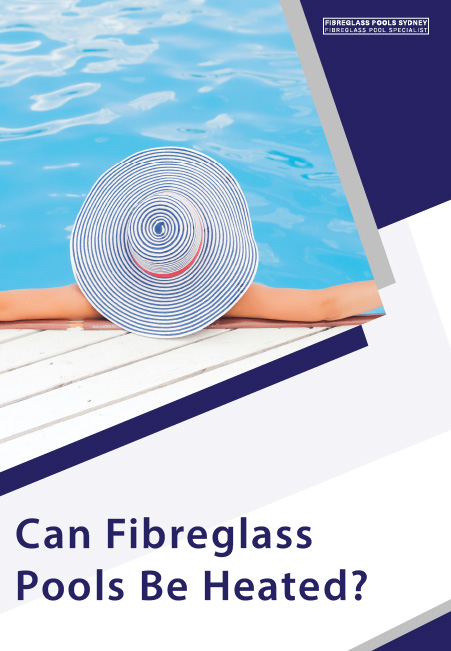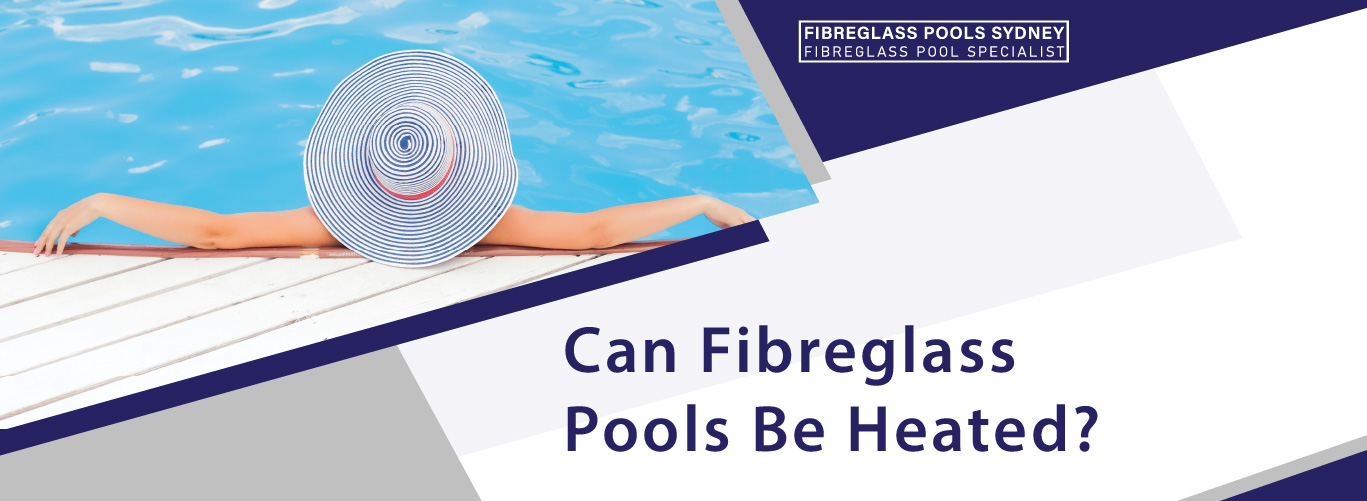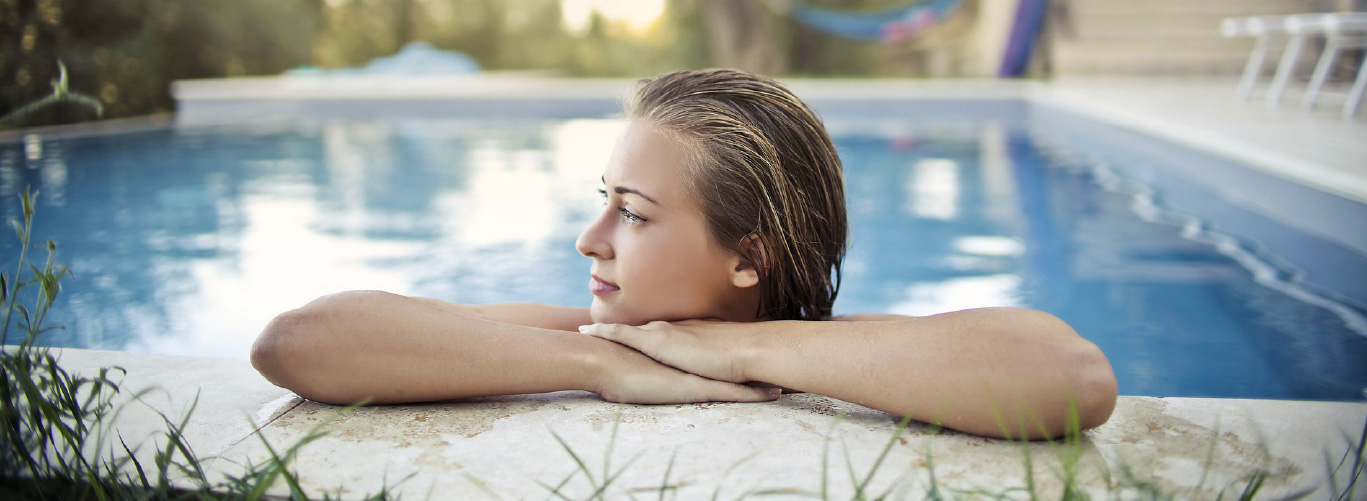Can Fibreglass Pools Be Heated?
Absolutely, fibreglass pools can indeed be heated, providing a comfortable swimming environment regardless of the season. The compatibility of fibreglass pools with various heating methods allows you to extend your swimming season, making your investment even more worthwhile. This article will delve into the different heating options available for fibreglass pools and their benefits, aiming to guide homeowners in making an informed decision.

How Can You Heat Your Fibreglass Pool?
There are three main ways to heat your fibreglass pool: gas heaters, heat pumps, and solar heating.
- Gas Heaters: By burning natural gas or propane, gas heaters can quickly heat your pool. These are ideal for those who don’t use their pool regularly but want it heated quickly when needed.
- Heat Pumps: Drawing heat from the air, heat pumps transfer this warmth to your pool. Although they are slower to heat the pool compared to gas heaters, they are more energy-efficient, making them a cost-effective long-term option.
- Solar Heating: If you live in a region that receives ample sunlight, solar heating can be an economical and environmentally friendly way to heat your pool. Solar heating systems use solar panels to collect heat from the sun, which is then transferred to your pool water.
Each heating option has its pros and cons, and what works best for you will depend on your specific needs, local climate, and budget.
Let's get into more detail about each heating option.
Gas Heaters
Gas heaters for fibreglass pools are popular due to their fast heating time. These heaters work by burning natural gas or propane to produce heat, which is then transferred to the pool water through a heat exchanger. Ideal for climates where rapid heating is required or for pools that aren’t used regularly, gas heaters can heat your pool to a comfortable temperature rapidly, irrespective of the air temperature. However, while gas heaters provide rapid heating, they can be costlier to run than heat pumps or solar heaters due to the cost of natural gas or propane. Furthermore, they may not be the most environmentally-friendly choice. However, when it comes to speed and convenience, gas heaters prove to be an incredibly effective choice.

Heat Pumps
Heat pumps, while slower at heating the pool water compared to gas heaters, are a more energy-efficient choice. They work by extracting heat from the air and transferring it to your pool water, essentially operating like a refrigerator in reverse. Given their method of operation, heat pumps perform more effectively in warmer climates or during the warmer months of the year. They are particularly cost-effective over a longer period, as they require less energy to operate compared to gas heaters, and thus have lower running costs. However, the initial investment for a heat pump can be higher than that of a gas heater. It’s also worth noting that their performance can be weather dependent, as they become less efficient in cooler temperatures. Nonetheless, for those prioritising energy efficiency and lower running costs, heat pumps are a compelling option.
Solar Heating
Solar heating is an eco-friendly and cost-effective method of heating your fibreglass pool, particularly suitable for regions with plentiful sunshine throughout the year. This method involves using solar panels, usually installed on your home’s roof, to harness energy from the sun. The collected solar energy is then converted into heat, which is transferred to your pool water. Solar heating systems require a sizable initial investment, mostly due to the cost of the solar panels. However, the operational costs are minimal as the energy from the sun is free. Moreover, these systems contribute to reducing your carbon footprint, making them an excellent choice for environmentally conscious homeowners. It’s important to note that the effectiveness of solar heating systems is contingent upon the amount of direct sunlight your location receives, and they may not perform as efficiently in overcast conditions or during the cooler months. Despite this, in the right conditions, solar heating can be a highly effective and sustainable option for heating your fibreglass pool.
Why Is It a Good Idea to Heat Your Pool?
Heating your fibreglass pool brings a host of enticing benefits. Firstly, it grants you the luxury of extending your swimming season, allowing you to relish in the pool even during cooler months when it would otherwise be too chilly. This ensures that you make the absolute most of your investment, harnessing your pool’s full potential. Moreover, a heated pool creates a blissfully comfortable swimming environment, elevating your overall aquatic experience. Particularly for individuals with health conditions like arthritis, a heated pool can offer therapeutic advantages, soothing joint pain and alleviating stiffness. Additionally, if you engage in pool training or exercise, warmer water temperatures can help stave off muscle strain and injuries. Lastly, a heated pool adds an attractive touch to your property, potentially enhancing its value. So, heating your pool is not just about indulging in comfort, but also about maximising functionality, reaping health benefits, and increasing value.

Maintenance Requirements for Each Heating Option
Each heating option comes with its unique maintenance requirements to ensure their optimal performance and longevity.
Gas Heaters
Gas heaters require regular maintenance to operate efficiently. This may include cleaning and checking the burner for any clogs or soot build-up, maintaining the proper pH balance in your pool to prevent corrosion of the heat exchanger, and getting your heater serviced by a professional annually to ensure all parts are functioning correctly.
Heat Pumps
Heat pumps require less maintenance compared to gas heaters. Regular checks should be made to ensure the evaporator coil is clean and free from debris and that the area around the heat pump is clear to allow for optimal airflow. An annual service by a professional is also recommended to ensure the system is working efficiently.
Solar Heating
Solar heating systems require minimal maintenance. The solar panels may need occasional cleaning to remove any debris or dirt that could affect their ability to absorb sunlight. In addition, checking for any leaks in the system and ensuring the pump is functioning correctly is also recommended. Most solar heating systems have a lifespan of 15-20 years with proper upkeep.
In all cases, maintaining your pool’s water chemistry is crucial. Imbalanced water can lead to inefficiency in heating and, in some cases, may even damage your heating system. Therefore, regular testing and adjusting of your pool water chemistry is a vital part of pool and pool heater maintenance.
Ultimately, the choice of a heating system for your fibreglass pool is largely dependent on your specific requirements and resources. Whether you opt for the immediate effectiveness of gas heaters, the energy efficiency of heat pumps, or the environmentally-friendly solar heating, each method has its unique advantages and maintenance needs. A balance between up-front costs, running costs, environmental impact, and the local climate should guide your decision. Remember, regular maintenance is key to ensure optimal performance and longevity of your choice. With the right heating method, you can extend your swimming season, enjoy therapeutic benefits, and add value to your property. Reach out to Fibreglass Pools Sydney for a free quote and if you have any questions!
Can Fibreglass Pools Be Heated?
Absolutely, fibreglass pools can indeed be heated, providing a comfortable swimming environment regardless of the season. The compatibility of fibreglass pools with various heating methods allows you to extend your swimming season, making your investment even more worthwhile. This article will delve into the different heating options available for fibreglass pools and their benefits, aiming to guide homeowners in making an informed decision.

How Can You Heat Your Fibreglass Pool?
There are three main ways to heat your fibreglass pool: gas heaters, heat pumps, and solar heating.
- Gas Heaters: By burning natural gas or propane, gas heaters can quickly heat your pool. These are ideal for those who don’t use their pool regularly but want it heated quickly when needed.
- Heat Pumps: Drawing heat from the air, heat pumps transfer this warmth to your pool. Although they are slower to heat the pool compared to gas heaters, they are more energy-efficient, making them a cost-effective long-term option.
- Solar Heating: If you live in a region that receives ample sunlight, solar heating can be an economical and environmentally friendly way to heat your pool. Solar heating systems use solar panels to collect heat from the sun, which is then transferred to your pool water.
Each heating option has its pros and cons, and what works best for you will depend on your specific needs, local climate, and budget.
Let's get into more detail about each heating option.
Gas Heaters
Gas heaters for fibreglass pools are popular due to their fast heating time. These heaters work by burning natural gas or propane to produce heat, which is then transferred to the pool water through a heat exchanger. Ideal for climates where rapid heating is required or for pools that aren’t used regularly, gas heaters can heat your pool to a comfortable temperature rapidly, irrespective of the air temperature. However, while gas heaters provide rapid heating, they can be costlier to run than heat pumps or solar heaters due to the cost of natural gas or propane. Furthermore, they may not be the most environmentally-friendly choice. However, when it comes to speed and convenience, gas heaters prove to be an incredibly effective choice.

Heat Pumps
Heat pumps, while slower at heating the pool water compared to gas heaters, are a more energy-efficient choice. They work by extracting heat from the air and transferring it to your pool water, essentially operating like a refrigerator in reverse. Given their method of operation, heat pumps perform more effectively in warmer climates or during the warmer months of the year. They are particularly cost-effective over a longer period, as they require less energy to operate compared to gas heaters, and thus have lower running costs. However, the initial investment for a heat pump can be higher than that of a gas heater. It’s also worth noting that their performance can be weather dependent, as they become less efficient in cooler temperatures. Nonetheless, for those prioritising energy efficiency and lower running costs, heat pumps are a compelling option.
Solar Heating
Solar heating is an eco-friendly and cost-effective method of heating your fibreglass pool, particularly suitable for regions with plentiful sunshine throughout the year. This method involves using solar panels, usually installed on your home’s roof, to harness energy from the sun. The collected solar energy is then converted into heat, which is transferred to your pool water. Solar heating systems require a sizable initial investment, mostly due to the cost of the solar panels. However, the operational costs are minimal as the energy from the sun is free. Moreover, these systems contribute to reducing your carbon footprint, making them an excellent choice for environmentally conscious homeowners. It’s important to note that the effectiveness of solar heating systems is contingent upon the amount of direct sunlight your location receives, and they may not perform as efficiently in overcast conditions or during the cooler months. Despite this, in the right conditions, solar heating can be a highly effective and sustainable option for heating your fibreglass pool.
Why Is It a Good Idea to Heat Your Pool?
Heating your fibreglass pool brings a host of enticing benefits. Firstly, it grants you the luxury of extending your swimming season, allowing you to relish in the pool even during cooler months when it would otherwise be too chilly. This ensures that you make the absolute most of your investment, harnessing your pool’s full potential. Moreover, a heated pool creates a blissfully comfortable swimming environment, elevating your overall aquatic experience. Particularly for individuals with health conditions like arthritis, a heated pool can offer therapeutic advantages, soothing joint pain and alleviating stiffness. Additionally, if you engage in pool training or exercise, warmer water temperatures can help stave off muscle strain and injuries. Lastly, a heated pool adds an attractive touch to your property, potentially enhancing its value. So, heating your pool is not just about indulging in comfort, but also about maximising functionality, reaping health benefits, and increasing value.

Maintenance Requirements for Each Heating Option
Each heating option comes with its unique maintenance requirements to ensure their optimal performance and longevity.
Gas Heaters
Gas heaters require regular maintenance to operate efficiently. This may include cleaning and checking the burner for any clogs or soot build-up, maintaining the proper pH balance in your pool to prevent corrosion of the heat exchanger, and getting your heater serviced by a professional annually to ensure all parts are functioning correctly.
Heat Pumps
Heat pumps require less maintenance compared to gas heaters. Regular checks should be made to ensure the evaporator coil is clean and free from debris and that the area around the heat pump is clear to allow for optimal airflow. An annual service by a professional is also recommended to ensure the system is working efficiently.
Solar Heating
Solar heating systems require minimal maintenance. The solar panels may need occasional cleaning to remove any debris or dirt that could affect their ability to absorb sunlight. In addition, checking for any leaks in the system and ensuring the pump is functioning correctly is also recommended. Most solar heating systems have a lifespan of 15-20 years with proper upkeep.
In all cases, maintaining your pool’s water chemistry is crucial. Imbalanced water can lead to inefficiency in heating and, in some cases, may even damage your heating system. Therefore, regular testing and adjusting of your pool water chemistry is a vital part of pool and pool heater maintenance.
Ultimately, the choice of a heating system for your fibreglass pool is largely dependent on your specific requirements and resources. Whether you opt for the immediate effectiveness of gas heaters, the energy efficiency of heat pumps, or the environmentally-friendly solar heating, each method has its unique advantages and maintenance needs. A balance between up-front costs, running costs, environmental impact, and the local climate should guide your decision. Remember, regular maintenance is key to ensure optimal performance and longevity of your choice. With the right heating method, you can extend your swimming season, enjoy therapeutic benefits, and add value to your property. Reach out to Fibreglass Pools Sydney for a free quote and if you have any questions!


